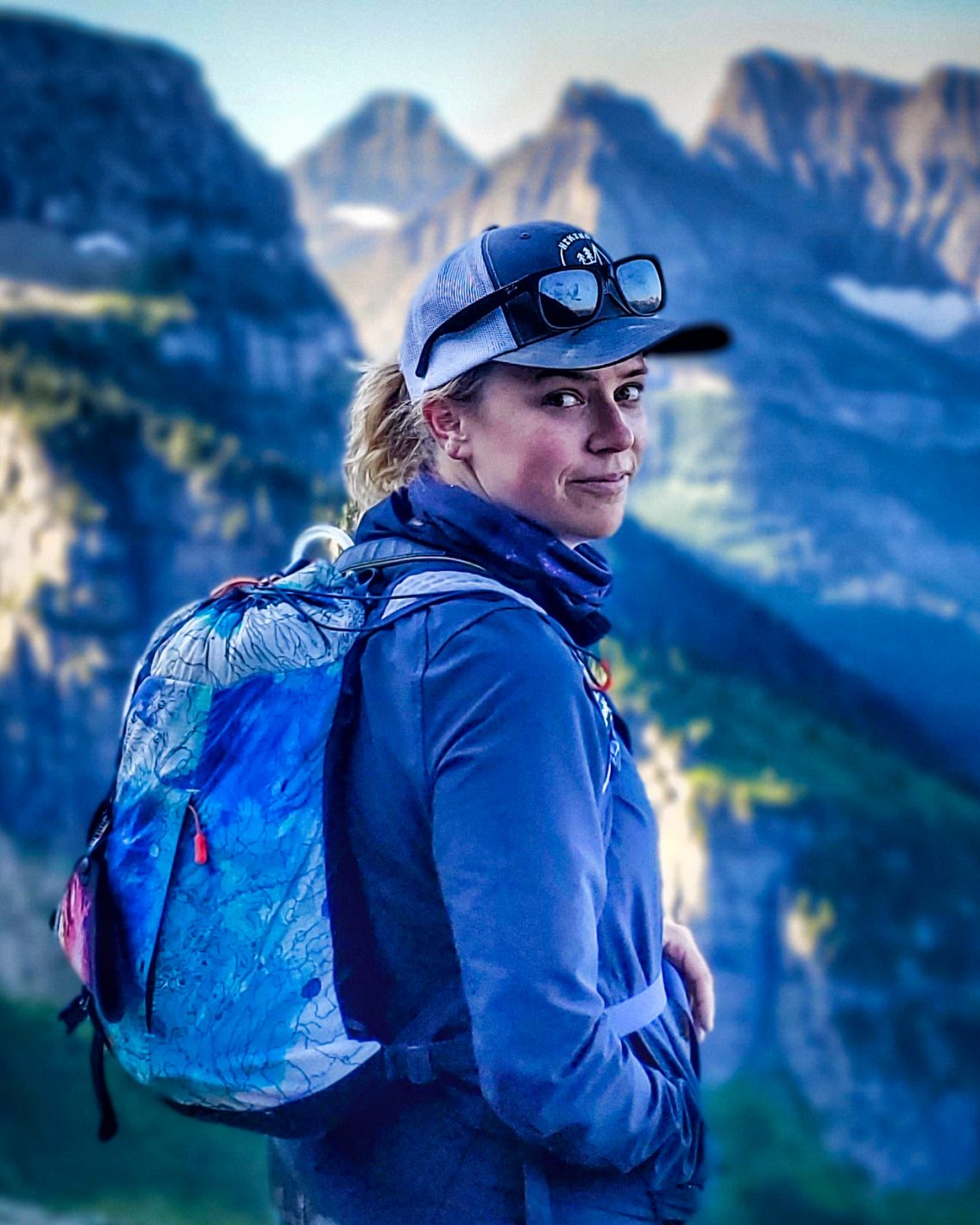We are privileged to be a part of someone’s journey. Many people who come take a class with us have fun and even life-changing experiences. But it’s such a treat when we get to hear how someone took the “yes, and” that they learned from us and took it to a whole new level. We sat down with Sydney Williams, a former competitive skydiver, corporate communications executive who founded Hiking My Feelings, a book and a new chapter of her life and life’s work.
FCI: So tell us some things we don’t know about you?
S: I was born in Kansas. I was a competitive skydiver. I will very rarely turn down an invitation to listen to live music.
FCI: You were a competitive skydiver, and for how long did you do that?
S: I was a skydiver for four years.
FCI: So, being afraid is not something that you’re unfamiliar with?
S: Correct. I wouldn’t say that I’m not a person that does not experience fear, I just have a unique system for managing it.
FCI: Right. So when it came to improv and doing improv, is that a whole new set of fear?
S: That was the scariest thing I’ve done. Way scarier than jumping out a plane.
FCI: Right?
S: Yeah, terrifying.
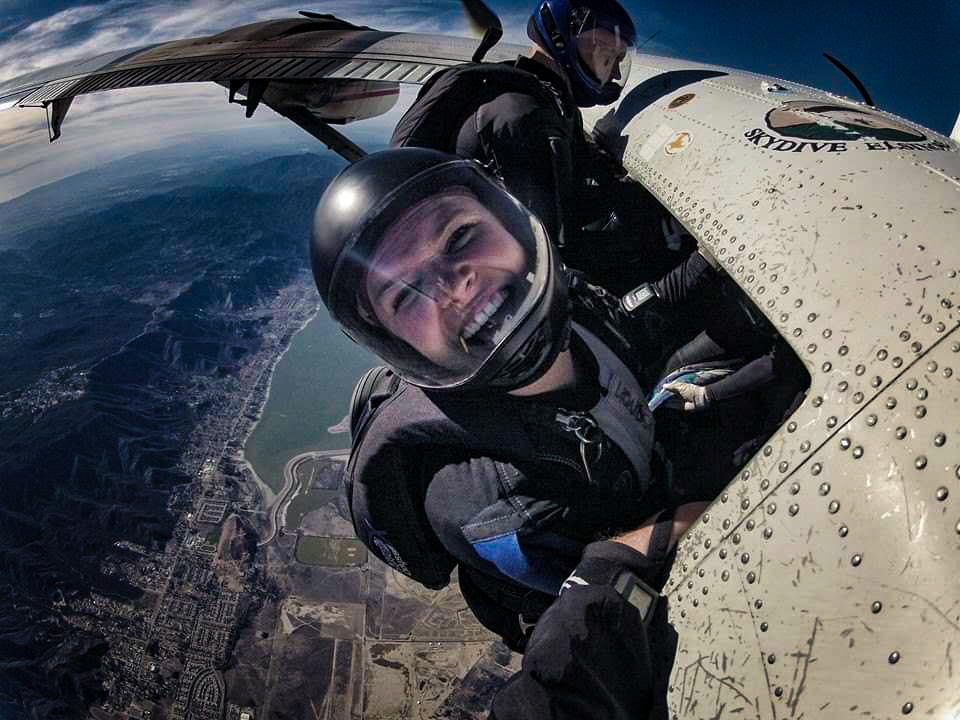
FCI: So, was improv something that you’d always been interested in, or was it something that just kind of came along? Tell me about that.
S: I don’t think I actually knew what improv was when I signed up for it. I had seen Whose Line Is It Anyway, I had been to a handful of improv shows, and then in 2017, towards the end of the year, I was like “Okay, 2018’s going to be my year for creative exploration. This is the year I’m going to do stuff that I’ve always wanted to try, but I’ve always been too scared to try for whatever reason, blah, blah, blah.” So I don’t know what I thought it was. I got there and it wasn’t what I expected, but it wasn’t bad. It was actually really cool, because it was something that I desperately needed – to remember how to play, because I was really good at it as a kid, and I had forgotten how to be silly. The containers around improv were exactly what I needed at the time.
FCI: Why?
S: I had just been diagnosed with diabetes two or three months before I signed up for the first class. I quit my super cushy agency job, six figure salary, working from home, platinum health benefits, because I was just so stressed out. I realized when I got diagnosed that every bragging point on my resume was actually teaching people how to be sick and how to be numb, and I was a byproduct of the work I had been doing. I had a 15-year career in corporate communications, primarily public relations and marketing. The most baller job that I had ever had in corporate, I quit. I had checked the boxes. Like I made six figures, I’m crushing it. That’s what my parents said I needed to do to be happy.
When I started improv I had just quit the agency and I joined my friend’s startup. I knew that joining a startup wouldn’t be a stress reducer, but my mission at that point was I wanted to turn my skills around to make a world a better place. The startup was rooted in women’s empowerment, social justice so I figured “yeah, I’ll be stressed, but I know I’m making the world a better place, so maybe the stress will be worth it.”
I had figured out my nutrition, I had started walking all the time, I’d take my medications as prescribed, but stress is what was the killer. I needed an outlet for my stress. Improv became that outlet.
FCI: So what was it about that first class that really helped you?
S: The whole idea that in improv there’s no rules, everything’s right. I’m so used to explaining myself and every decision that I make. When I was in Level Two, Jesse Suphan (my teacher) was like “Yeah, you don’t have to do that anymore”, because I’d make a mistake in a scene and then explain it away, and he’s like “What are you doing?”
I was like “I’m telling you why I fucked up,” and he told me I didn’t have to do that. “Yeah, you don’t have to do it here and you don’t have to do it in your life either.” I was like “Wait a minute. What?” – my mind was blown!
FCI: What else about improv kept you going?
S: When I started I was getting all this permission to just let go of stuff. Let go of my need to be perfect, let go of my need to explain everything that I ever messed up, let go of my need to have control over every situation. I can’t control what my teammates are going to do in a scene. I have no idea what’s going to come out of their mouths. So the structure and in some ways the lack thereof, and taking it back to being kids in grownup clothes, there was something so magical about that, that reminded me not only is it okay to play, but how to do it and why it’s beneficial.
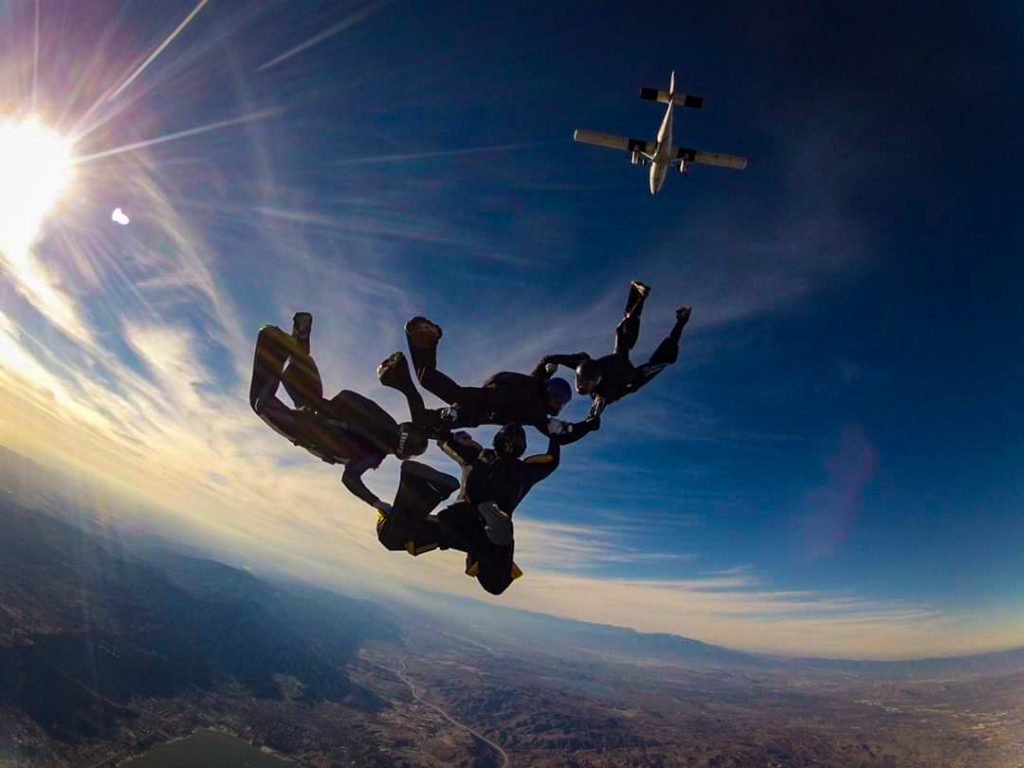
FCI: Where are you at in your improv journey now?
S: Where I’m at in my life currently, improv as an art form isn’t something that I have any intention to pursue, but it was definitely exactly what I needed when I had it in my life. I also realized through this process that I have been performing a character my entire life and that’s what improv taught me, and it was kind like a release from the need to do that as well.
FCI: Wow. That’s huge.
S: For so long, I had been performing the role of who I thought I should be to meet my parents’ expectations, to meet the expectations that I thought I should meet in society, and the expectations I had set on myself based on the path that my parents had outlined for me. I feel like improv freed me from that as well.
FCI: So improv really changed your life.
S: Oh 100%. There’s so many different nuances that have influenced the way that my life has blossomed in the last two years because I took a chance on myself with improv. I don’t know if it’s just San Diego improv, or if it’s improv in general, or theater kids, or whatever, but my classmates, we were instant family and we were so there for each other. When the concept of having your back is the foundation of the relationship, there’s this immediate bond because we’re all so silly and uncomfortable and weird and vulnerable, so we just connected immediately. That family walked me through how to quit this toxic work environment. So in the span of the three levels of improv I did, I had quit a job, started and quit the startup, and then decided to go hike across Catalina Island.
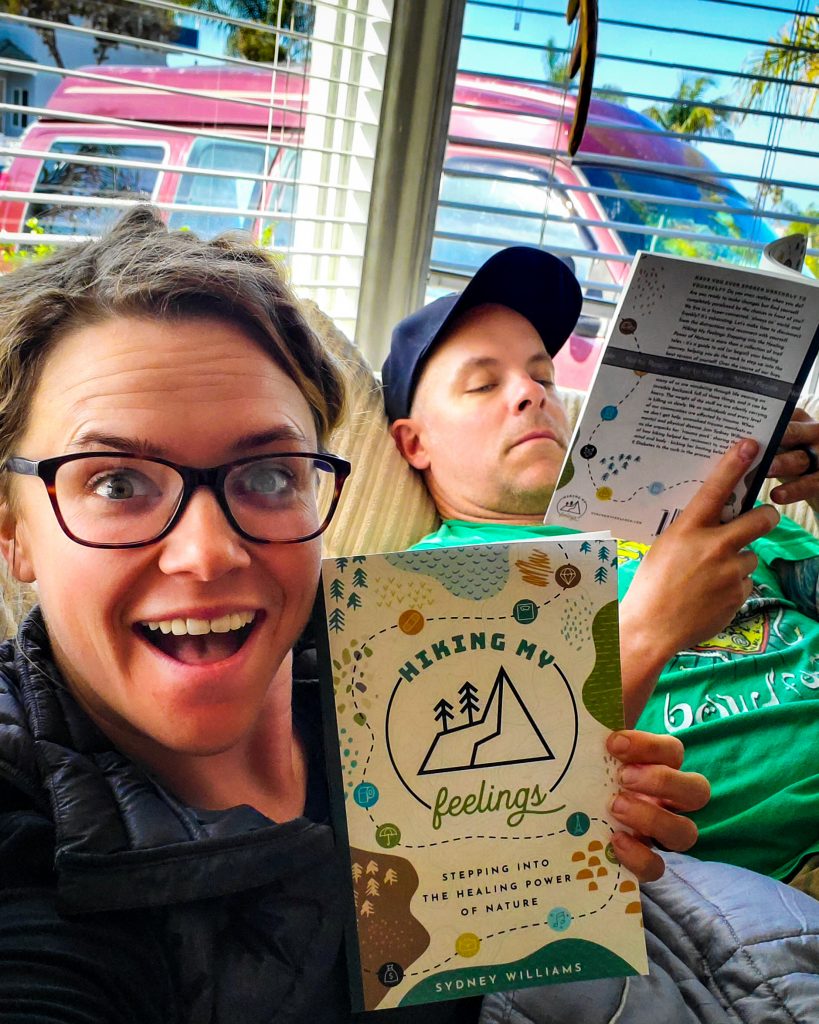
“This is what I want for myself. I want to be in a community like this, and I don’t know if improv’s it, but I want to create a space, or a feeling, or a community, or something that feels this good.”
FCI: Tell me about more about how that happened.
S: There’s a chapter in my book “You Don’t Need the Money” which is named after the conversation I had with my classmate outside Finest City Improv. I was outside Amy’s Bon Voyage party before she left to go sailing in 2018, and I was just so moved that so many people cared about this woman and were so appreciative of the community she created. I sat there in awe thinking, “This is what I want for myself. I want to be in a community like this, and I don’t know if improv’s it, but I want to create a space, or a feeling, or a community, or something that feels this good.” The only time that I had seen that much appreciation for a human prior to that party was at skydiving memorials for my friends that died.
FCI: So you quit the startup. How did Hiking My Feelings Come about?
S: I had cleared out all this space for whatever was supposed to come next to come in and gave it room to grow and blossom. On a training hike after I quit the startup, but before we hiked across Catalina Island, I realized that I was hiking my feelings instead of eating and drinking them. It started as just like a realization that I shifted a coping mechanism.
FCI: Interesting. So what was it that prompted you to the next phase?
S: After I hiked the Trans-Catalina Trail the second time, I was connected with an employee at REI and they wanted to send me on a speaking tour around Southern California to their different stores. After I got off the phone with them we then used “Yes, and …” concept to have the biggest brainstorm of what I want to do with my life that I’ve ever had. My husband and I took those huge Post-it notes and put them all over our living room. I started the process with a simple question – “okay, so if it’s going to start with three days in Southern California and I know that I’m not going to get paid, because REI doesn’t pay speakers, but they will promote what I’m working on, what am I working on?” At that point I wasn’t working on anything – I was unemployed with nothing lined up. There was nothing in my way. So I thought, “well, could I make this speaking tour nationwide? Could I just go tell this story to whoever I want? Could I tell the story during the weekdays and then go hike on the weekends? The things that I care about and the things that I’m talking about – how hiking helped me heal my mind and body – could I go and bring that people to the trail and show them for themselves? Walk the walk, talk the talk? Could we do it?”
FCI: So how did the talk go?
S: We started with a date at FCI because I needed a dry run, it’s a stage I’m comfortable on, because I spent most of the year here, and Amy supported the talk. So I did my test talk in September, we did three dates in October, and then nothing else happened. I didn’t have anything else scheduled but I knew this is what I want to do for the rest of my life. We sold everything and we bought our van. I realized the best way for me to manage this disease is to build a life where I can prioritize hiking and I can prioritize caring for my mental health and actual self-care. Not just like bubble baths, but working through my trauma. So the intention was build a life so I can heal, and that’s exactly what we did.
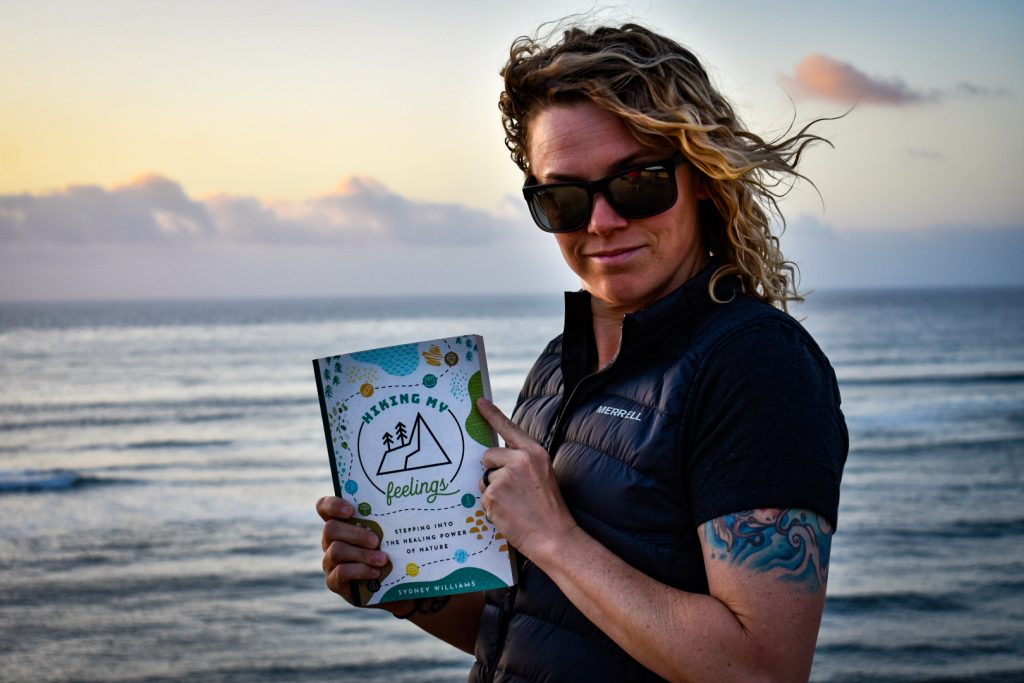
@hikingmyfeelings
We went around the country this year, we booked our own tour, we booked our own hikes. I found the routes that I wanted to take. I found the parks that I wanted to visit. I knew the people that I wanted to visit, because this is like a reunion tour to go around the country and visit old skydiving friends, old college friends, old family, whatever, and then we just did it. I did 64 talks, we led 69 hikes. The presentation that I gave on tour this year was the outline for the book, which I wrote while we were on the road, it was just published on December 3rd. In 2020, we’re going around the country again to do a book tour. When we get back the plan is to open a retreat center so people can do this healing with us in one place. It is a desire of mine to have a place where people can come and congregate, and that’s the community that I want to build. That’s the place that I didn’t yet have the vision for when I was listening to everybody gush about how wonderful Amy is and how this theater has changed their lives, mine included, but now that part of the vision is clear. So that’s what we’re striving towards.
FCI: Nice. Oh my gosh. So as a result of this, you’ve figured out the life that you wanted to build and built it, and now the community you want to build, and you’re building it? That’s amazing. That is so amazing.
S: Improv is a gateway drug, man. It is some good stuff.
FCI: What would you tell someone if they’re thinking about taking an improv class?
S: I think we have to be aware of the language that we use. You can sign up for improv and if you hate it, you’re might think, “well, that was a waste of time”, but is it? Because you just learned about something that you didn’t like, and that’s learning more about yourself. That’s really just the goal, right? Like you want to learn about the things you like and the things you don’t. Just because you don’t like it doesn’t mean that it’s not good for you, or that you didn’t learn something, or that it was a waste of time. It’s so powerful to ignore the how and all the things that usually get us caught up and make us quit before we even start. If you can ignore all that and just “Yes, And …” the crap out of it … the opportunities are endless. If you want to be an improviser, go for it. If you’re a person with a stressful job, and especially if you work in client services, or creative work, or anything where it’s like you get paid to have ideas, try an improv class. Even just a Level One, it can revolutionize the way you lead a meeting, and the way you lead a brainstorm. It has completely changed the way I do business and how I live my life.
Learn how improv can help in your life and try a free class!
This article is part of the Community Spotlight Series highlighting our amazing students, teachers, and performers.
Are you an FCI student or graduate that has a great story to share? We’d love to feature you! Let us know.

